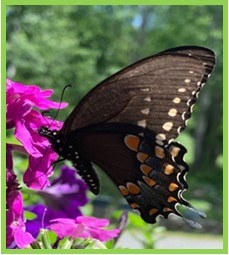Posted: August 1, 2022
Planting a few host plants for caterpillars can attract this beautiful butterfly to your garden and is an excellent introduction to gardening for pollinators and supporting native insect species.

Black Swallowtail Butterfly
Have you ever wondered about those "bugs" crawling around on some herbs, particularly parsley, dill, and fennel, in your garden? If you are lucky, your garden is now a host to caterpillars of the beautiful black swallowtail butterfly and is part of their ecosystem.
Papilio polyxenes, commonly known as the black swallowtail, are found throughout North America. Their range stretches from southern Canada to South America, though most commonly found in eastern North America. These beautiful butterflies frequent fields, meadows, wetlands, and your backyard.
The butterflies lay their pale-yellow eggs on host plants. The host plants in our gardens include members of the carrot family (Apiaceae), including dill, parsley, fennel, and carrots. The eggs darken as they mature and hatch in three to nine days.
The caterpillar emerges mostly black with red-orange dots and a white band. As it grows, the caterpillar changes to a green body with vertical black stripes with yellow dots. The larval stage lasts about 10 to 30 days. During this stage, they may be garden pests. A few caterpillars can quickly consume a small plant and may be considered a nuisance! However, adding other host plants provides additional food for the caterpillars and allows gardeners to enjoy the harvest.
The mature caterpillar will wander away to find a place to pupate on a plant stem, tree trunk, or wall. It forms a green chrysalis lasting 14 to 21 days. The butterfly emerges to lay more eggs for the next generation of black swallowtails. This second generation of caterpillars will create a light brown chrysalis that lasts all winter. These butterflies will emerge the following spring.
In addition to providing host plants for the caterpillars to eat, be sure to provide flowering plants to supply nectar to the adults.
Text and photographs by Kate Shinko,
Penn State Extension Master Gardener of Susquehanna County

